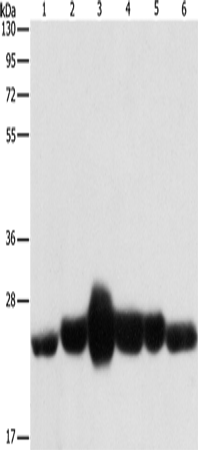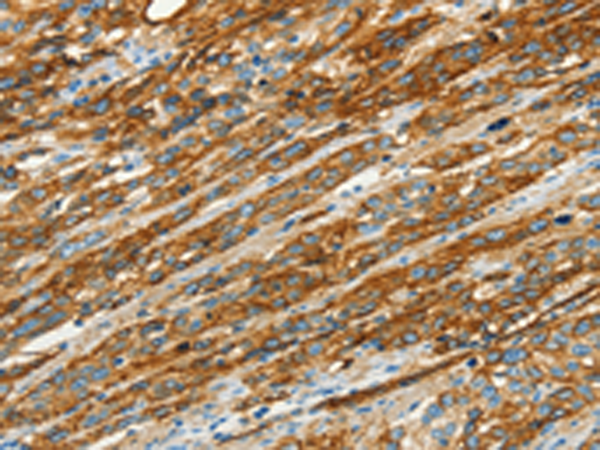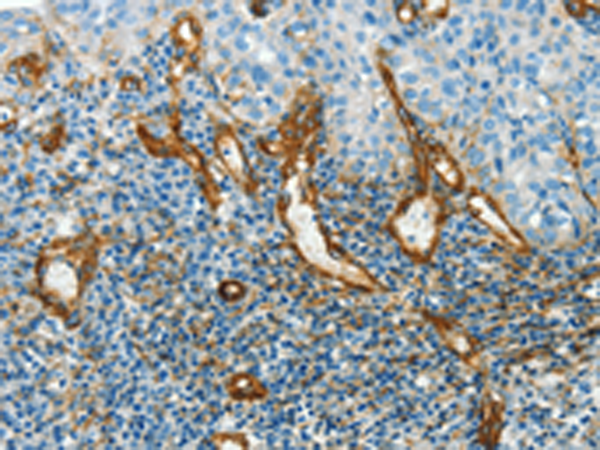


| WB | 咨询技术 | Human,Mouse,Rat |
| IF | 咨询技术 | Human,Mouse,Rat |
| IHC | 1/50-1/200 | Human,Mouse,Rat |
| ICC | 技术咨询 | Human,Mouse,Rat |
| FCM | 咨询技术 | Human,Mouse,Rat |
| Elisa | 1/2000-1/10000 | Human,Mouse,Rat |
| Aliases | CGL3; PPH3; BSCL3; VIP21; MSTP085 |
| WB Predicted band size | 20 kDa |
| Host/Isotype | Rabbit IgG |
| Antibody Type | Primary antibody |
| Storage | Store at 4°C short term. Aliquot and store at -20°C long term. Avoid freeze/thaw cycles. |
| Species Reactivity | Human, Mouse, Rat |
| Immunogen | Synthetic peptide of human CAV1 |
| Formulation | Purified antibody in PBS with 0.05% sodium azide and 50% glycerol. |
+ +
以下是关于CAV1抗体的3篇代表性文献,涵盖不同研究领域:
---
1. **文献名称**:*Caveolin-1 knockout mice show pulmonary endothelial cell hyperproliferation and angiogenesis via a nitric oxide-dependent mechanism*
**作者**:Drab M, et al.
**摘要**:通过CAV1基因敲除小鼠模型,结合抗体检测,发现CAV1缺失导致肺内皮细胞异常增殖和血管生成,其机制与一氧化氮信号通路失调密切相关。
---
2. **文献名称**:*Loss of stromal caveolin-1 expression predicts poor clinical outcome in triple-negative breast cancers*
**作者**:Sloan EK, et al.
**摘要**:利用CAV1抗体分析三阴性乳腺癌患者的肿瘤微环境,发现基质细胞中CAV1表达缺失与转移风险升高和患者生存率下降显著相关,提示其作为预后标志物的潜力。
---
3. **文献名称**:*Caveolin-1 regulates TGF-β signaling and cancer-associated fibroblast formation in prostate cancer*
**作者**:Di Vizio D, et al.
**摘要**:研究CAV1抗体在前列腺癌成纤维细胞中的表达,揭示CAV1通过调控TGF-β信号通路促进肿瘤相关成纤维细胞活化,从而驱动肿瘤微环境重塑和侵袭性进展。
---
以上文献分别从血管生成、乳腺癌预后及前列腺癌微环境角度探讨CAV1的功能,均涉及抗体在机制研究中的应用。
Caveolin-1 (CAV1) is a key structural and regulatory protein involved in forming caveolae, specialized plasma membrane invaginations that participate in cellular processes such as signal transduction, endocytosis, and lipid homeostasis. As a scaffolding protein, CAV1 interacts with various signaling molecules (e.g., G-proteins, receptor tyrosine kinases) to modulate pathways like EGFR, MAPK, and nitric oxide signaling. CAV1 antibodies are essential tools for detecting this protein in research, aiding in studies of its roles in cancer, cardiovascular diseases, and metabolic disorders.
In cancer, CAV1 exhibits dual roles, acting as a tumor suppressor in some contexts (e.g., inhibiting oncogenic signaling) or promoting metastasis in others. Its dysregulation is linked to prostate, breast, and lung cancers. In cardiovascular and metabolic diseases, CAV1 influences endothelial function, atherosclerosis, and insulin sensitivity. CAV1 antibodies are widely used in techniques like Western blotting, immunohistochemistry, and immunofluorescence to assess expression levels, localization, and interactions in tissues or cell lines.
Discrepancies in CAV1-associated findings across studies highlight context-dependent roles, possibly due to tissue-specific isoforms or post-translational modifications. Research using CAV1 antibodies continues to clarify its complex involvement in fibrosis, neurodegeneration, and infection mechanisms, making it a focal point for therapeutic targeting.
×